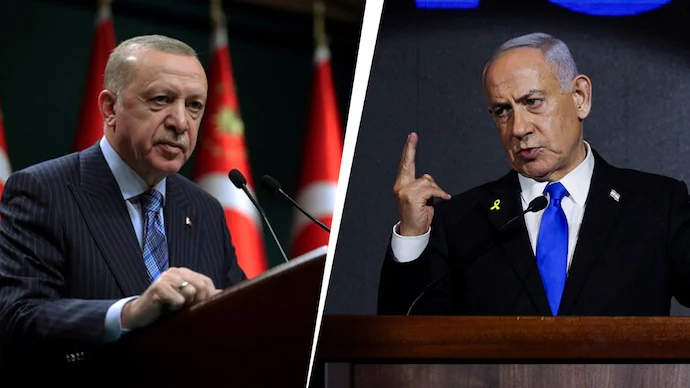
The bilateral relationship between Turkey and Israel have experienced its ebbs and flows, but since the war in Gaza, the trajectory has remained mostly downward. The Trump administration has so far exerted pressure on Israel and Turkey to settle their differences. Yet this does not mean that the worsening of relations with Israel comes without costs for Turkey.
First, Israel is likely to play a role in undermining Turkey’s efforts to procure critical weapons from the United States. Ankara remains under the Countering America’s Adversaries Through Sanctions Act (CAATSA) because of its purchase of Russian S-400 air defense systems, a move that led to its expulsion from the F-35 fighter jet program. Turkey still lacks a viable alternative to modernize its air force. It continues to hope that these sanctions might be eventually lifted, allowing it to rejoin the F-35 program. In the meantime, Ankara has decided to purchase Eurofighter Typhoon jets, produced jointly by the United Kingdom, Italy, Germany, and Spain, which are capable but still inferior to the F-35s.
What Ankara seems to underestimate, however, is that even if it somehow resolves the S-400 issue, whether by transferring the systems back to Russia, to a third country, or through a direct intervention by President Trump, it will still face an Israeli lobbying effort in Washington aimed at blocking the sale of next-generation aircraft and other critical systems. As long as Tel Aviv views Ankara as a hostile or unreliable actor, Israel will work to preserve its qualitative military edge. Turkey may dismiss this as a problem for another day, but it is already a factor that should shape its defense prospects.
Second, one of Ankara’s stated priorities in Syria is to back the new government in Damascus headed by Ahmad al-Sharaa. A major predicament for Turkey’s efforts to stabilize Syria is Israel’s understandable reservations about Hay’at Tahrir al-Sham (HTS), an organization that was previously affiliated with al-Qaeda, taking root in a neighboring country. Nevertheless, Ankara worries that if the Sharaa administration were to fall, Syria would likely face another round of civil war and that it would lose its recently acquired influence in the country. Moreover, the collapse of the new government in Syria could unleash a new wave of refugees to neighboring countries—an outcome that Turkey is determined to prevent at all costs. For Israel, however, such instability might be seen as an acceptable, if not even a welcome, price to pay for keeping Syria fragmented and limiting Turkey’s influence. If Ankara wants a stable Syria, it has to work its way with Israel as well.
Third, Israel could seek to raise the costs of any future Turkish intervention in eastern Syria. The Syrian government and the Syrian Democratic Forces (SDF) have recently made progress toward reconciling their differences, particularly regarding the integration of the People’s Protection Units (YPG) into the national army and the future distribution of power in Damascus. Yet their relationship remains fragile.
Turkey views this Kurdish entity in Syria, particularly one with undeniable links to the Kurdistan Workers’ Party (PKK), as a national security threat. Turkish leaders, including President Erdoğan and Foreign Minister Hakan Fidan, have repeatedly issued warnings about the possibility of a cross-border operation if the SDF preserves its full autonomy. If Ankara’s tentative new peace process with the PKK collapses — a scenario that analysts do not rule out — the likelihood of such an intervention will rise sharply.
In that event, Israel may take steps to complicate Turkey’s operations to put pressure on the SDF through diplomatic or intelligence means, though direct support to the SDF would remain unlikely. This would align with Israel’s preference for a fragmented and weakened Syria and its desire to counter what it perceives as Turkey’s growing regional ambitions.
Managing Regional Friction
To defuse tensions, Turkey has to engage Israel and acknowledge its concerns. The deconfliction mechanisms established in Syria have already proved their worth by preventing incidents that could have escalated into open confrontation. Similarly, coordination, however limited, could help manage friction over Gaza.
In this context, it is uncertain whether Turkey will eventually join the International Stabilization Force (ISF) in Gaza, but the issue remains part of ongoing regional discussions. So far, Turkey’s efforts to join the force have been blocked by both Israel and Egypt. This exclusion could, however, prove a blessing in disguise. If a future United Nations mandate were to require the ISF to disarm Hamas by force, Turkish troops could find themselves in the undesirable position of fighting Palestinians. Moreover, Turkish forces, like other ISF contingents, could easily be caught in crossfire between Hamas militants and Israeli troops while attempting to monitor the ceasefire.
The divide between Turkey and Israel on regional issues is significant but still manageable. Failure to contain it could prompt Israel to further undermine Turkey’s security priorities and increase its costs, as illustrated by its recent arms sale to Cyprus. The same reasoning applies to Israel. Although Turkey refrains from direct confrontation, it may raise the costs of Israel’s regional policies. Tensions between Turkey and Israel have not yet reached a breaking point, but they need to factor in Ankara’s security calculations.